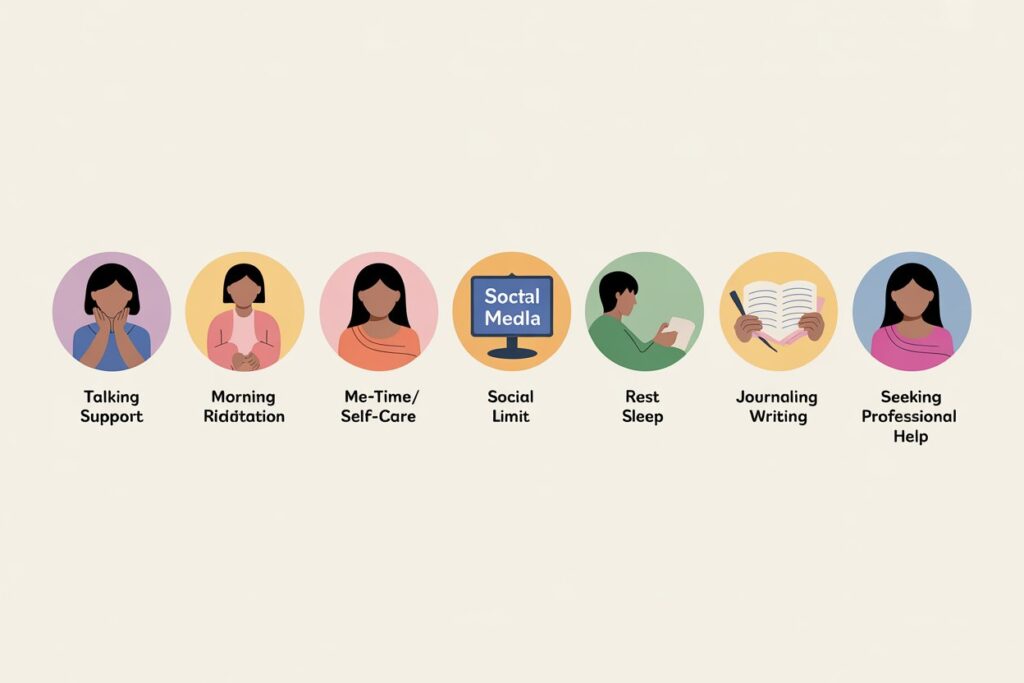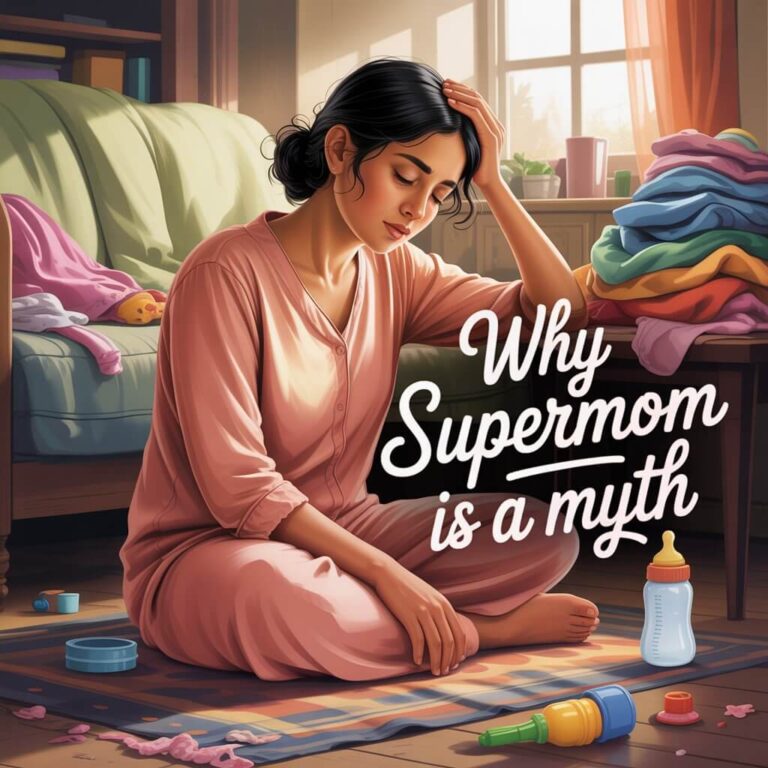Motherhood is often described as magical — a journey filled with love, tenderness, and unforgettable moments. But behind the smiles and baby giggles, many mothers silently struggle with emotions they never expected. One moment, you’re overwhelmed with joy, and the next, you’re in tears, questioning whether you’re “enough.” This emotional rollercoaster is more common than most people realize, especially in Indian households where new moms are expected to stay strong, put family first, and rarely speak about their own mental health.

The truth is simple yet powerful: taking care of your emotional and mental well-being after childbirth is just as important as caring for your newborn. In this article, we’ll talk openly about postpartum mental health in India, particularly for mothers in Tier 2 and Tier 3 cities where resources and support can be limited. It’s time we break the silence, one mother at a time.
What No One Talks About After Delivery
When a baby is born, the world turns its full attention to the newborn. Everyone asks, “How’s the baby?” But rarely do people stop to ask, “How are you, Mumma?”
After delivery, while your body is healing, your emotional health often goes unnoticed. Many Indian mothers quietly endure feelings of:
- Anxiety and panic attacks that make the heart race.
- Unpredictable mood swings or crying spells without reason.
- Loneliness, even when surrounded by people.
- Guilt for wanting space or time away from the baby.
- Loss of identity or feeling disconnected from the woman you were before motherhood.
These are not signs of weakness or failure — they are signs of emotional overload. And they deserve care and compassion.
What Is Postpartum Mental Health?
Postpartum mental health refers to the emotional, psychological, and behavioral challenges that mothers can experience after childbirth. While becoming a mother can bring immense joy, it also comes with profound changes—hormonal, physical, and social—that can affect a woman’s mental well-being. These challenges can range from mild and temporary to more intense and persistent, and recognizing them early is crucial for both mother and baby.
The most common conditions affecting postpartum mental health include:
- Baby Blues: A short-term experience of mood swings, tearfulness, irritability, or anxiety, typically appearing within the first two weeks after delivery. Baby blues usually resolve on their own, but they are often a mother’s first sign of emotional changes after childbirth.
- Postpartum Depression (PPD): A deeper and longer-lasting condition characterized by persistent sadness, fatigue, feelings of guilt, hopelessness, or loss of interest in activities once enjoyed. PPD can affect a mother’s ability to bond with her baby and manage daily life.
- Postpartum Anxiety: Marked by constant worry, restlessness, racing thoughts, or even panic attacks, postpartum anxiety can occur on its own or alongside depression. It often makes it difficult for mothers to feel calm, sleep well, or enjoy time with their newborn.
Fact: According to the World Health Organization (WHO), Worldwide about 10% of pregnant women and 13% of women who have just given birth experience a mental disorder, primarily depression. In India, many cases go undiagnosed due to lack of awareness, cultural expectations, and stigma surrounding mental health.
The Silent Weight of Emotional Exhaustion
If you’ve ever felt drained despite a full night’s sleep, found yourself quietly crying in the dark, or endlessly scrolling through social media feeling like you’re “falling behind,” know that you are not alone. Experiencing emotional exhaustion after childbirth is real—and it doesn’t mean you love your baby any less. This is a vital aspect of postpartum mental health that is often overlooked.
Many new moms describe it as:
- Loving their baby deeply but missing the person they once were.
- Putting on a brave face around family and friends, while quietly breaking down in private.
- Feeling trapped between societal expectations and their own personal exhaustion.
Acknowledging these feelings is the first step toward healing. They are not weaknesses or failures; they are important signals that your mind, body, and heart need care and support. Prioritizing postpartum mental health isn’t just about coping—it’s about reclaiming your sense of self and finding balance in this new chapter of life.
It’s also important to remember that emotional exhaustion doesn’t appear the same for everyone. Some moms feel irritable, anxious, or persistently sad, while others might feel numb or disconnected from their surroundings. These experiences are all valid, and talking openly about them—whether with a partner, friend, or mental health professional—can help lighten the burden.
Self-care may feel like a luxury, but even small daily acts—like stepping outside for fresh air, enjoying a warm cup of tea, or simply resting while your baby sleeps—can support your postpartum mental health.
Mom Guilt: The Hidden Burden
If there’s one emotion almost every mother knows too well, it’s mom guilt. Maybe you’ve felt guilty for ordering food instead of cooking, for taking a nap, for leaving the baby with someone else for an hour, or for wanting to return to work. Add constant advice from relatives and the pressure to be “the perfect mom,” and guilt becomes overwhelming.
But here’s the truth every mother needs to hear: “You cannot pour from an empty cup.” Your baby does not need perfection — they need you to be emotionally present, healthy, and happy. Letting go of guilt is not selfish; it’s survival.
Letting go of mom guilt also means setting realistic expectations and boundaries. It’s okay to ask for help, to make decisions that prioritize your mental health, and to acknowledge that some days will be harder than others. Every small step you take to care for yourself strengthens your postpartum mental health and models resilience and self-compassion for your child.
Remember: feeling guilty doesn’t make you a bad mother—it makes you human. Recognizing and addressing these feelings is one of the most important acts of love you can give both yourself and your baby.
7 Mental Health Tips for Indian Moms That Actually Work
Caring for your postpartum mental health doesn’t have to be complicated. Small, practical steps—tailored to the Indian mom’s lifestyle—can make a big difference in how you feel emotionally, mentally, and physically.
- Talk About It
Sharing your thoughts and feelings can lighten the invisible weight of motherhood. Open up to someone you trust—your partner, a close friend, or another mom who understands the journey. Sometimes, just voicing your fears reduces their intensity. If possible, consider professional counseling. Therapy can provide guidance, coping strategies, and validation for what you’re going through. - Start a Gentle Morning Ritual
Even 10 minutes of deep breathing, stretching, or listening to calming music can set a positive tone for the day. A small morning ritual helps you center yourself before the day’s responsibilities take over. In Indian households, this could be as simple as stepping onto the balcony with a cup of chai and taking mindful breaths before the day begins. - Create Small “Me-Time” Pockets
You don’t need an entire day off to care for yourself. Even 20–30 minutes of guilt-free time—reading a book, journaling, listening to music, or dancing—can recharge your spirit. These small breaks nurture postpartum mental health and remind you that your needs matter too. - Limit Social Media
Scrolling through perfectly curated feeds can fuel self-doubt and mom guilt. Instead, follow real-mom pages that uplift, inspire, and normalize the ups and downs of motherhood. (Pro tip: Follow @HugMumma for support and reminders that you’re never alone in this journey.) - Rest Without Guilt
Sleep deprivation is one of the biggest triggers for postpartum stress and anxiety. Rest whenever you can—without labeling it as “lazy.” Even short naps, or simply closing your eyes while the baby sleeps, contribute to healthier postpartum mental health. - Write It Out
A “Mumma Journal” can become a powerful tool. Writing down emotions, worries, gratitude, or even small daily victories can help process feelings and release mental clutter. Journaling fosters self-awareness, tracks emotional patterns, and can be therapeutic when feelings feel overwhelming. - Seek Professional Help
In India, therapy is gradually shedding its stigma, but many moms still hesitate to reach out. Consulting a counselor or psychiatrist doesn’t make you weak—it demonstrates strength and self-awareness. Remember, postpartum depression, anxiety, and other mood disorders are treatable. Early intervention can make your journey smoother and positively impact your bond with your baby.
Bonus Tip: Nutrition, hydration, and gentle exercise—like a short walk in the morning—also support emotional well-being. Taking care of your body strengthens your mind, creating a foundation for sustainable postpartum mental health.

When to See a Mental Health Expert
While emotional ups and downs are a normal part of adjusting to life with a newborn, there are moments when seeking professional help is essential. Your postpartum mental health matters, and reaching out for support is a sign of strength, not weakness.
Consider contacting a mental health professional if you experience any of the following:
- Disconnection from your baby: Feeling emotionally distant or unable to bond with your child can be distressing, and it may indicate postpartum depression or anxiety.
- Overwhelming anxiety or sadness: Persistent worry, panic, or sadness that interferes with daily life is a signal that additional support is needed.
- Hopelessness or feelings of worthlessness: If you frequently feel like you’re “failing” as a parent or have thoughts of giving up, it’s crucial to seek help.
- Thoughts of harming yourself: Any thoughts of self-harm or feeling unsafe in your own mind are urgent warning signs that require immediate professional attention.
It’s important to remember that these experiences are not uncommon, and they do not define you as a mother. With timely intervention—whether through counseling, therapy, support groups, or medication when appropriate—full recovery is possible. A mental health expert can help you navigate these challenges, develop coping strategies, and restore balance, ensuring both you and your baby thrive.
Even if your symptoms feel “mild” or you’re unsure whether help is needed, reaching out early can prevent them from escalating and can make a significant difference in your postpartum mental health journey. Asking for help is an act of care—for yourself and for your family.
HugMumma Says: You’re More Than Just a Mom
Yes, you’re a mother — but you’re also a woman with dreams, a person with feelings, and a soul that needs love. Your identity doesn’t end with motherhood; it expands with it. HugMumma’s mission is to ensure that Indian moms, especially those in Tier 2 and Tier 3 cities, feel supported, celebrated, and never alone in their journey.
You’re Not Alone, Mumma
To every mother silently reading this: you are not failing, you are not weak, and you are not alone. Healing takes time, but every step you take is proof of your strength.
Remember: your mental health is not a luxury — it’s a necessity. And HugMumma is here to walk with you, hand in hand, as you embrace both the beauty and the challenges of motherhood.




